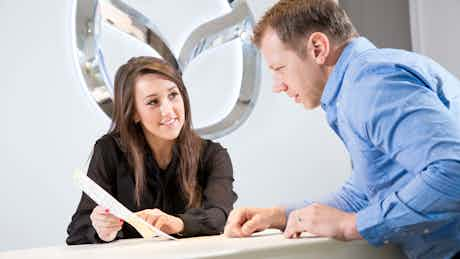Lease purchase explained
November 22, 2022 by John Tallodi

A lease purchase – sometimes referred to as a conditional sale – is a type of purchasing arrangement where you become the owner of the vehicle at the end of the agreement.
Lease purchase is one of the less common forms of car finance – PCP is by far and away the most popular – but a lease purchase could still be right for you.
The basic premise involves a deposit, a set number of monthly payments and a final balloon payment whereupon the vehicle becomes yours. We examine the pros and cons of a lease purchase and how to structure it to suit your specific needs.
How does a lease purchase agreement work?
At the commencement of a lease purchase, you will be required to pay a deposit. This can be in the form of cash, vehicle trade-in or a combination of the two. You will then agree upon a set period where you will make monthly payments. Once this period has been completed you will need to pay a final balloon payment whereupon you take ownership of the vehicle.
Deposit
The larger this amount the lower your monthly payments and final balloon payment will be.
Monthly payments
These payments will vary based on the new vehicle value, contract length, estimated residual value of car and your deposit. The monthly payments usually range between 24 and 60 months. A longer contract period means lower monthly payments, but more paid back in total due to the interest portion.
Balloon payment
This figure will be the outstanding amount owed once the contract term is at its end. It will vary based on how large your deposit and monthly payments have been. The final payment will typically be around 20% of the cost of the car.
Typical example of a Lease Purchase agreement:
Vehicle Purchase Price £40,000
10% Deposit £4,000
Monthly payments £520,83 (£25,000 over 48 months)
Balloon Payment £11,000
We are assuming a 0% interest here for ease of calculation. In most cases there will be interest charged on the full amount including the balloon payment. That’s why the shorter the contract length, the lower your total costs will be.
A Lease Purchase is very similar to a Personal Contract Purchase (PCP) agreement, but there is no option to hand back the vehicle and the balloon payment has to be settled at the end of the agreement.
A Hire Purchase (HP) agreement also requires a deposit and monthly payments, but there is no balloon payment at the end which makes the monthly payments higher than with a Lease Purchase.
Pros and cons of lease purchase
Pros
- You own the vehicle outright at the end of the agreement
- Monthly payments are generally lower than other financing types
- Deposit tends to be lower than with other finance options
- Flexible contract terms
Cons
- You do not have the option of handing the vehicle back
- You will need to have enough saved up for the balloon payment at the end of the contract
- A longer contract means lower monthly payments but higher overall cost due to the interest portion
Who is eligible for lease purchase?
As with any finance deal, you will need to meet certain criteria to be eligible for a lease purchase. To start with, you will need to have a minimum of a ‘good’ credit score rating with one of the main credit ratings agencies in the UK. As a rough estimate, a score of 700 and above is desirable.
The deposit amount, monthly payments and balloon payment value will also have a bearing on the terms the finance institution offers you.
To apply for a lease purchase, you will need the following:
- Proof of address
- Employment details for previous three years
- Monthly income from all sources
- Banking details
Improving your credit rating requires making regular monthly payments on time and keeping your credit utilisation low. Not moving homes frequently can also show financial stability to lenders. But these things all take time.
There are several things you can do right now to optimise your current score:
- Register on the electoral roll
- If you have a joint account, check if your partner, friend or family member is pulling your score down
- Ensure that all your personal details are correct – incorrect information can lower your score
- Monitor your account for fraudulent activity – someone applying for credit under your name can lower your score
Is lease purchase right for me?
Lease purchase is a good match for you if you:
- Want to own your car at the end of the finance agreement
- Prefer to make lower monthly payments
- Will have enough saved up to make the final balloon payment
Lease purchase isn’t right for you if:
- You like to change cars every few years
- You may not want to own the car at the end of the agreement
Aside from a lease purchase, there are several other finance packages to choose from.
These include:
Personal Contract Purchase – You pay a deposit and monthly instalments at the end of which there is a final optional balloon payment. If you settle the balloon payment the car is yours. If not, you return the car to the dealer.
Personal Contract Hire – Essentially a long-term car rental. You pay a deposit and monthly payments for an agreed period. At the end of the contract you hand the car back.
Hire Purchase – A loan comprising of a deposit and monthly payments up to 60 months whereafter the car becomes yours.
Personal Loan – A straightforward loan from a financial institution to be used for just about any purchase. The terms are flexible and will change depending on the amount loaned and your credit rating.
Lease purchase FAQs
Can I purchase my leased car early?
You may be able to purchase your lease car early, however, you will need to settle the full outstanding amount and may be liable for early settlement penalties. Most leasing companies want you to stay the course so they can get the most out of the deal.
In some instances, you can request to buy the car outright from the leasing company by requesting a buyout amount or settlement figure from them. If that amount is closer to the market value of the car than the penalty charges, then this may be a better option.
If you’ve paid 50% or more of the total amount due, then you can use something called an early termination clause. This lets you return the car without having to make any further payments. You won’t of course own the car through this method, but it may help you get out of a lease deal that you can no longer afford.
Do lease payments go towards the purchase of my car?
Yes. A lease purchase essentially allows you to pay off a portion of your car for an agreed period and then settle the remaining amount in one lump sum at the end of the contract. The monthly payments you make all go towards paying off the car.
What is the difference between lease purchase and hire purchase?
Lease purchase agreements comprise of a deposit, monthly payments and a final balloon payment at the end of the contract. The car becomes yours once this final amount has been paid.
Hire purchase agreements comprise of a deposit and monthly payments. At the end of the contract the car is yours. The monthly payments are higher as you are paying off the full value of the car and not just a portion of it. The total interest paid tends to be lower for a hire purchase agreement than a lease purchase, so your total costs should also be lower overall.
Who offers lease purchase?
Many finance service providers offer lease purchase agreements. As always it is worth shopping around for the best deals. But don’t waste your time searching the internet all day, let carwow do it all for you.
Cars Change? Carwow!
Looking for a new set of wheels? With Carwow you can sell your car quickly and for a fair price – as well as find great offers on your next one. Whether you’re looking to buy a car brand new, are after something used or you want to explore car leasing options, Carwow is your one stop shop for new car deals.















